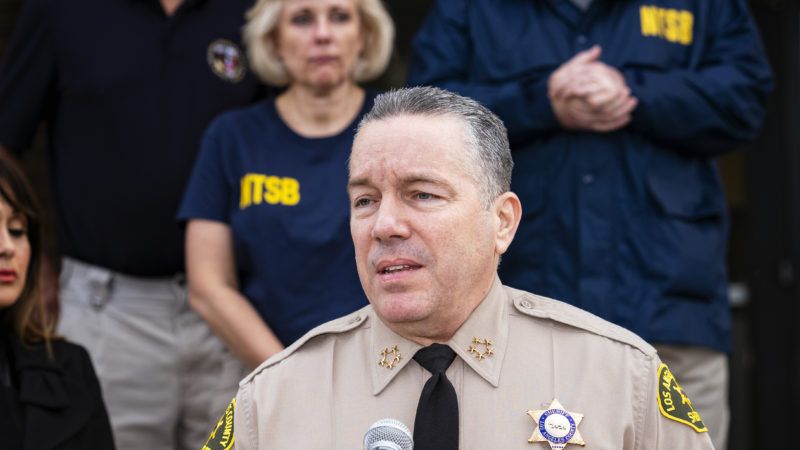L.A. County Sheriff Alex Villanueva Says Gun Dealers Are 'Nonessential.' The Department of Homeland Security Disagrees.
The county's ban on firearm sales is inconsistent with a new federal advisory as well as the Second Amendment.

The National Rifle Association (NRA) has joined other gun rights groups in challenging COVID-19 control measures that ban the sale of firearms. In a federal lawsuit filed on Friday, the NRA argues that California Gov. Gavin Newsom's March 19 business closure order, which Los Angeles County Sheriff Alex Villanueva has interpreted as covering gun dealers, violates the Second Amendment and the right to due process.
Villanueva's interpretation is not only constitutionally questionable but seemingly untenable in light of new guidance from the federal Department of Homeland Security. In an advisory issued on Saturday, the department added firearm retailers to its definition of the "essential critical infrastructure workforce." The order by Newsom (D) specifically exempted "federal critical infrastructure sectors."
In California, the NRA's complaint notes, "individuals are required to purchase and transfer firearms and ammunition through state and federally licensed dealers" so required background checks can be completed. Newsom's order, as interpreted by Villanueva, therefore prevents Californians from lawfully acquiring firearms or ammunition until the edict is relaxed or rescinded. "Such a de facto prohibition on the right to keep and bear arms is categorically unconstitutional under the Second Amendment," says the NRA, which was joined in the lawsuit by the Second Amendment Foundation, the Firearms Policy Coalition, the California Gun Rights Foundation, a Los Angeles County resident, and a Burbank gun dealer.
While "the circumstances posed by the [COVID-19] outbreak are noteworthy," the complaint says, they "do not excuse unlawful government infringements upon freedom." In fact, the NRA argues, "the need for enhanced safety during uncertain times is precisely [why] Plaintiffs and their members must be able to exercise their fundamental rights to keep and bear arms."
In addition to exempting "federal critical infrastructure sectors," Newsom's order said he "may designate additional sectors" but did not suggest any or list criteria for choosing them. The order also said "Californians must have access to such necessities as food, prescriptions, and health care," items they may leave their homes to obtain. But it did not say what other goods or services might count as "necessities."
That same day, the Los Angeles County Department of Public Health issued an order requiring the immediate closure of all "non-essential businesses." It allowed continued operation of "essential businesses," including "establishments engaged in the retail sale of…household consumer products" and "products necessary to maintaining the safety, sanitation, and essential operation of residences."
Last Tuesday, Villanueva declared that gun dealers are "non-essential" and announced that his deputies would be forcing them to close. The next day, the sheriff said he was suspending that anti-gun operation pending Newsom's determination of whether firearm sales should be allowed to continue. But on Thursday, after Newsom said he would let local sheriffs decide that issue, Villanueva reiterated that gun stores are "non-essential" and "must close to the general public" to comply with the orders from the governor and the county. Violating the state and county orders is a misdemeanor punishable by up to six months and up to 90 days in jail, respectively.
San Diego Sheriff Bill Gore, by contrast, has said gun stores perform a "valuable public service" and may continue to operate in his jurisdiction. In Gore's view, gun dealers enhance public safety by allowing enforcement of background checks and California's 10-day waiting period for firearm purchases. He worried that Californians might turn to the "black market" if they cannot legally buy guns for self-protection.
In addition to running afoul of the Second Amendment, the NRA says, the business closure orders are so vague that they violate the right to due process: "The subject Orders do not define critical terms; they encompass protected and non-protected actions; they omit definitions of key terms; they operate as complete bans; they do not require specific intent to commit an unlawful act; and they permit and encourage arbitrary and erratic arrests and convictions with too much discretion committed to law enforcement. This breadth and built-in vagueness run afoul of the due process clause because the subject Orders fail to give adequate guidance to those who would be law-abiding, to advise them of the nature of the offense with which they may be charged, or to guide courts in trying those who are accused of violating such Orders."
The Firearms Policy Coalition (FPC), one of the plaintiffs in the California lawsuit, recently persuaded Pennsylvania Gov. Tom Wolf (D) to reverse a policy that required gun stores in that state to close. Although the Pennsylvania Supreme Court rejected the FPC's application for extraordinary relief, three justices strongly dissented, saying "it is incumbent upon the Governor to make some manner of allowance for our citizens to continue to exercise this constitutional right."
The FPC also challenged the closure of gun stores under a COVID-19 order issued by New Jersey Gov. Phil Murphy (D). On Monday, Murphy announced that gun dealers will henceforth be considered "essential" businesses, citing the new guidance from the Department of Homeland Security.
"I am pleased that Gov. Murphy is finally recognizing and honoring our constitutional right to bear arms, especially amid this State of Emergency," said state Sen. Michael Testa (R–Cumberland). "The Second Amendment is essential to all law-abiding citizens, particularly for increased safety, security, and self-protection. New Jerseyans' rights to purchase a firearm should have never been infringed upon in the first place."
Update: Villanueva has rescinded his ban on gun sales, citing the revised federal guidelines.


Show Comments (49)